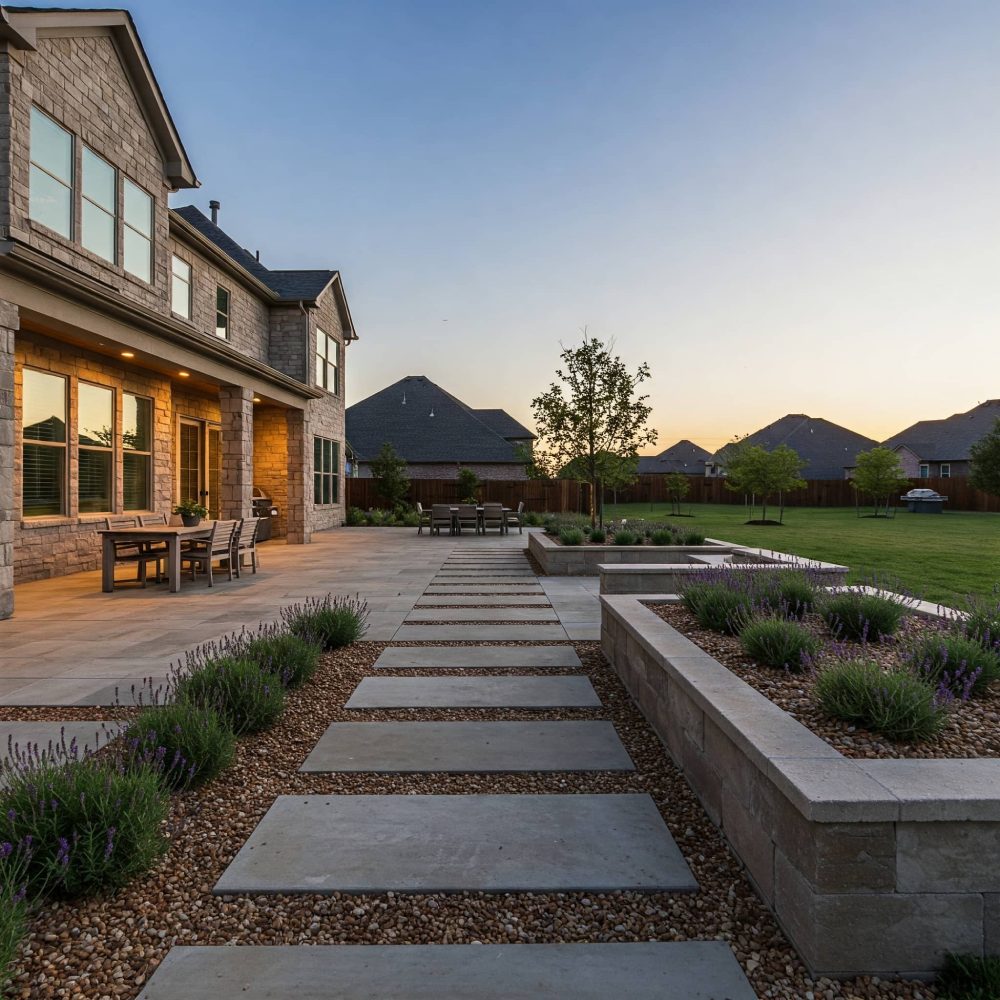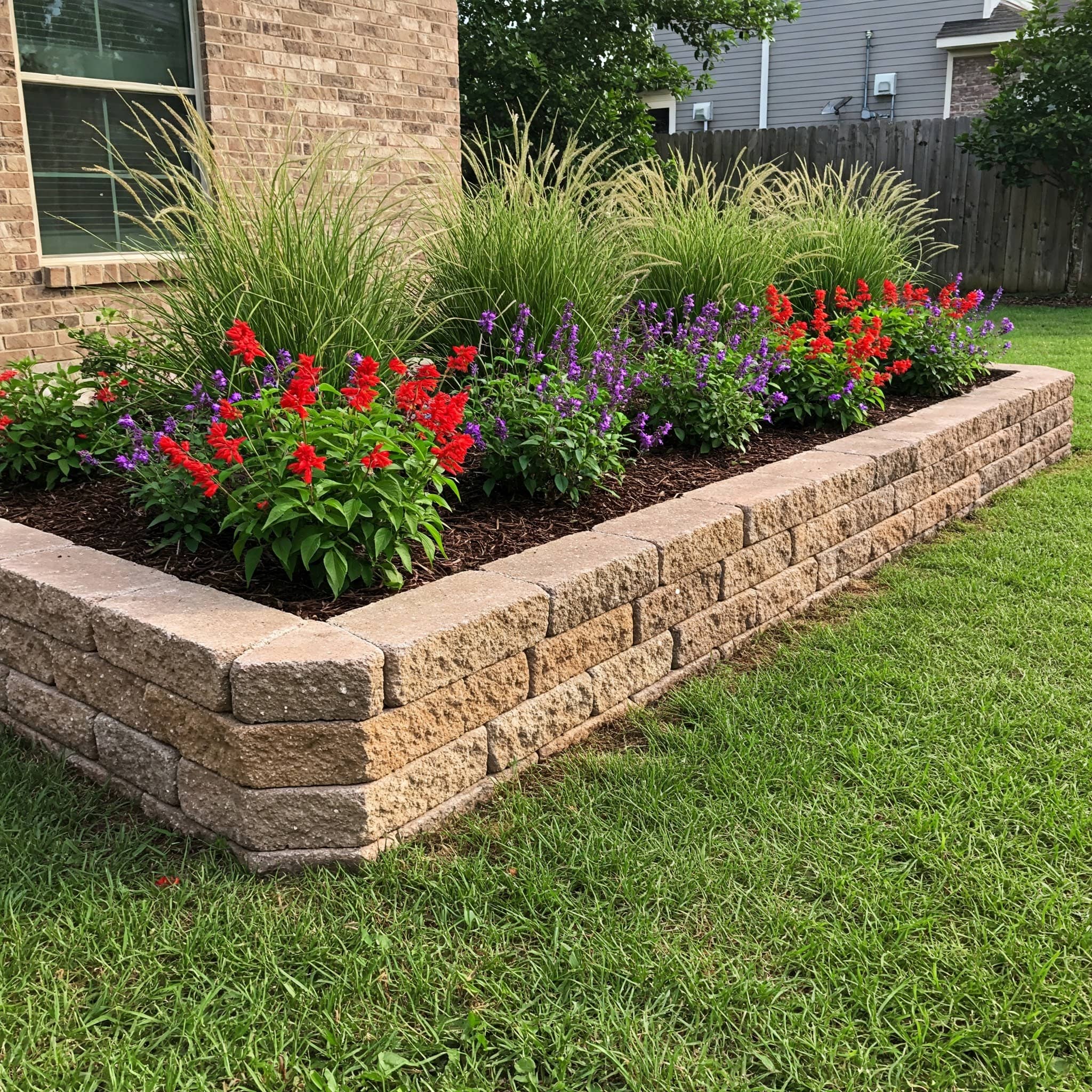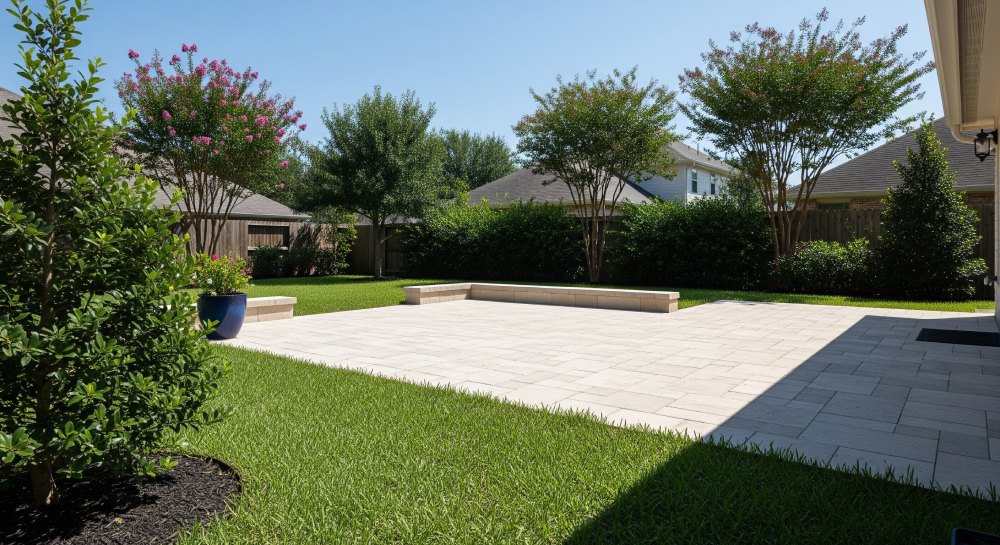
Concrete vs. Pavers: What’s Best for Houston’s Summer Weather?
Concrete vs. Pavers: What’s Best for Houston’s Summer Weather?
If you’re planning a new patio in Houston, you already know the summer weather here can be brutal — not just on people, but on outdoor surfaces. The combination of extreme heat, heavy humidity, and shifting clay soil creates real challenges for patio durability and comfort.
At Houston Landscape Images, we’ve been building custom patios and hardscapes in Houston for over 30 years. One of the most common questions we get from homeowners is: Should I go with concrete or pavers for my patio?
The answer depends on a few key factors — like how you plan to use the space, what kind of maintenance you're okay with, and how much performance you need over time. In this guide, we’ll break down the pros and cons of both options and help you decide what works best for your Houston home.
Table of Contents
Why Patio Materials Matter in Houston's Climate
Concrete Patios in Houston: Pros and Cons
Paver Patios in Houston: Pros and Cons
Which Patio Option Handles Houston Heat Better?
Which Patio Option Adds More Curb Appeal and Value?
Let HLI Help You Choose the Right Patio for Houston’s Climate
Why Patio Materials Matter in Houston's Climate
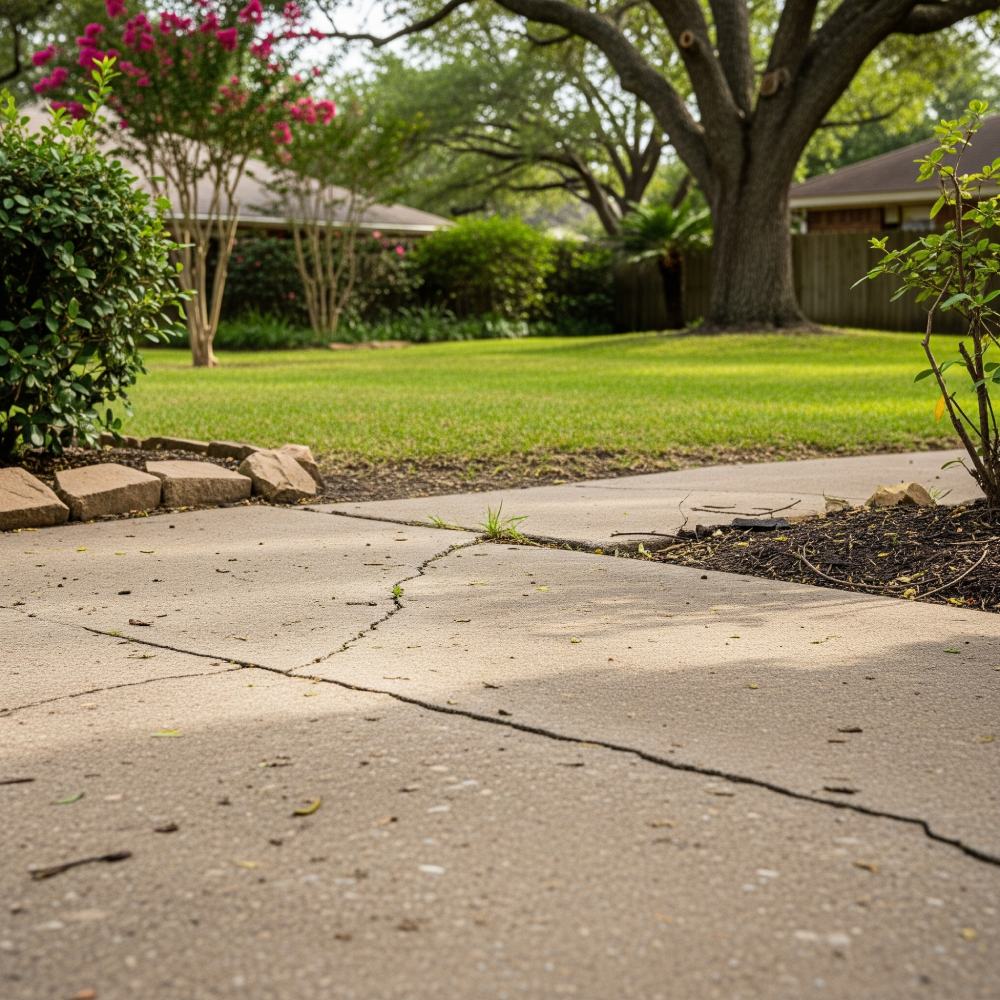
Houston’s climate puts more pressure on outdoor materials than most cities. Between the long stretches of 95°+ heat, tropical humidity, and intense summer storms, even the toughest patios can show signs of wear if they’re not built right.
And don’t forget about the soil — much of Houston sits on expansive clay, which shrinks and swells with seasonal moisture changes, leading to cracks, shifting, and drainage problems. The materials you choose need to handle both the weather and the ground beneath it.
That’s why we never take a one-size-fits-all approach at HLI. We tailor every patio project based on the yard, usage goals, and climate performance of each material.
Concrete Patios in Houston: Pros and Cons
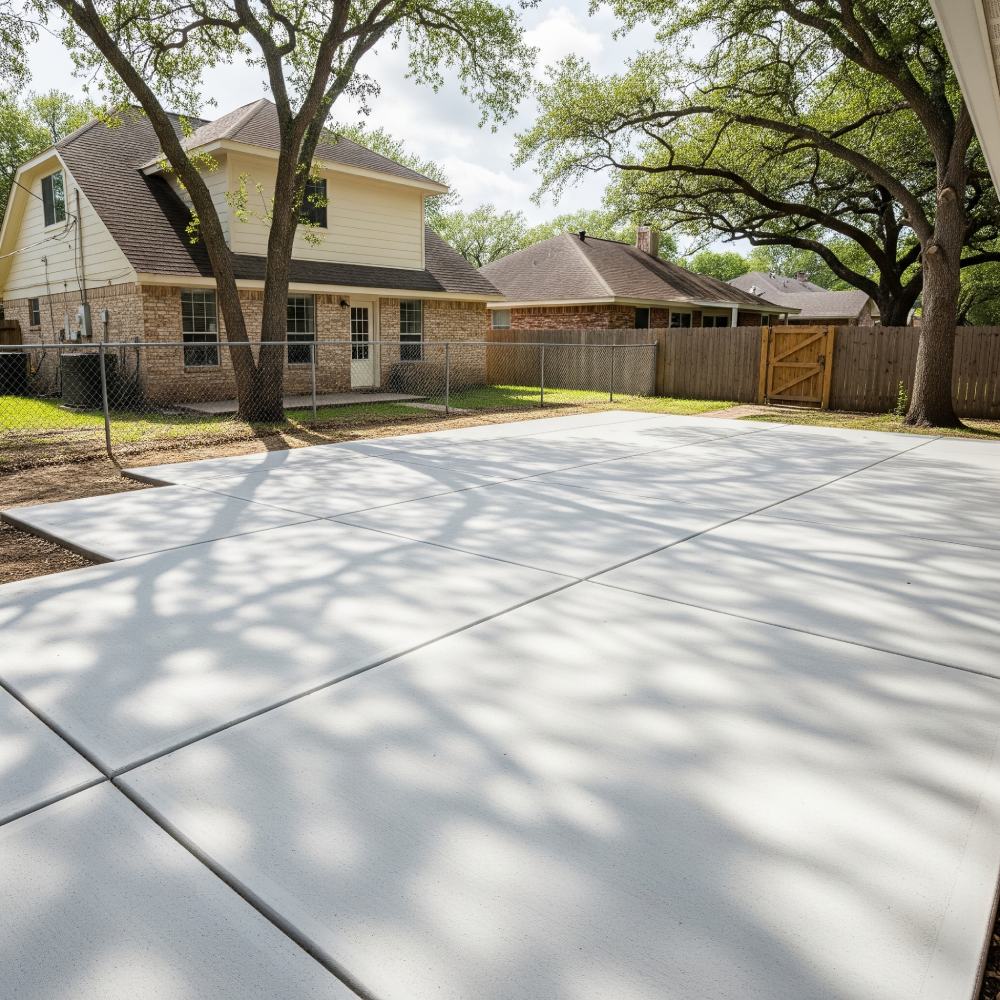
Concrete patios are a common option for homeowners looking for a clean, streamlined look at a relatively low cost. When poured and finished properly, concrete offers a smooth, durable surface that works well for larger areas like outdoor kitchens, pool decks, and lounge spaces.
Advantages of concrete patios in Houston:
Cost-effective for large surfaces
Fast to install
Customizable with stamps, stains, and finishes
Can be poured with subtle slopes for water drainage
Drawbacks to consider:
Susceptible to cracking due to soil movement
Can become extremely hot under direct sun
Repairs are difficult and often require full replacement
Surface stains can be difficult to remove without sealing
Concrete is a solid choice for budget-conscious patio installation in Houston, but it does require proper base prep and long-term maintenance to prevent cracks or discoloration — especially in the summer heat.
Paver Patios in Houston: Pros and Cons
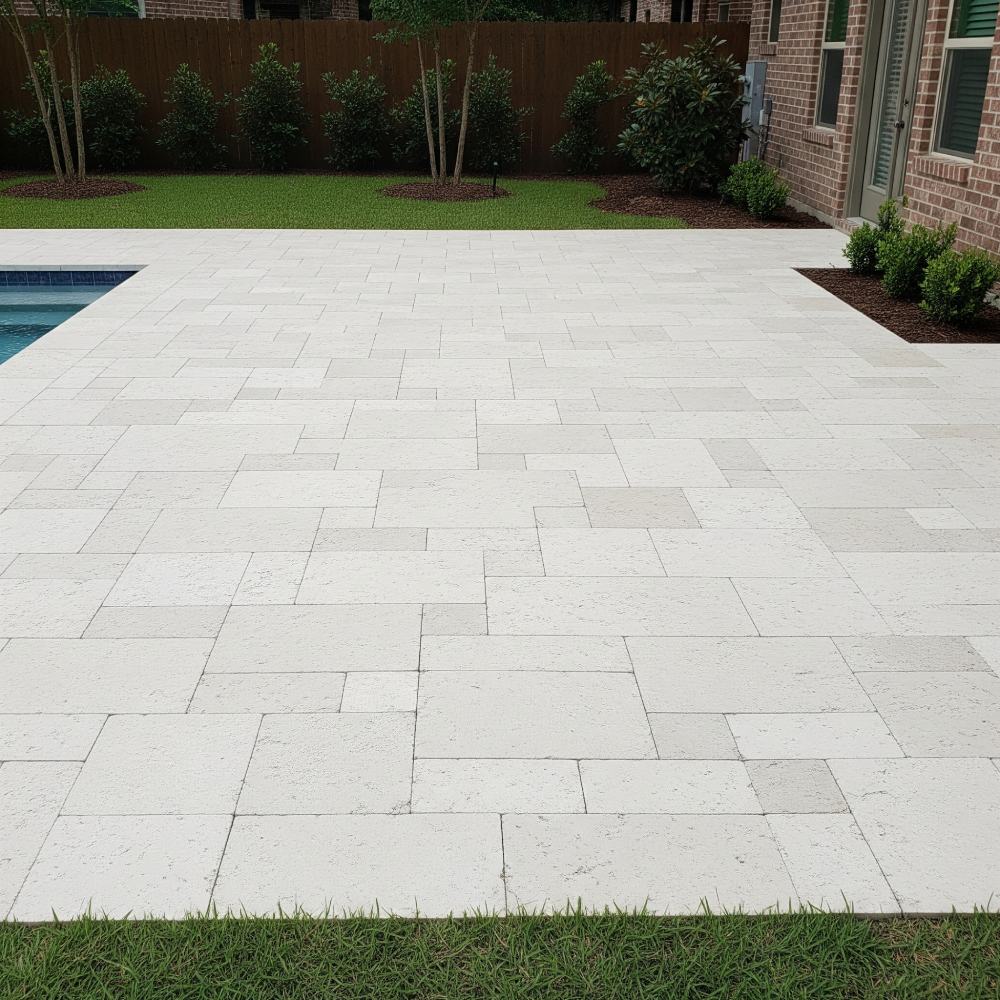
Interlocking pavers offer a more flexible, visually dynamic alternative to concrete. These modular units are made from concrete, brick, or natural stone, and they’re installed over a compacted gravel base with sand or polymeric jointing material.
Advantages of paver patios in Houston:
Flexible installation handles soil movement better
Individual pavers can be replaced — no need to tear up the whole patio
Cool-touch options available (like travertine or light-toned concrete)
Visually enhances home value and curb appeal
Excellent drainage when installed with a permeable base
Drawbacks to consider:
Higher upfront material and labor cost
Weeds or ants can develop in joints without proper sealing or base prep
Pavers are ideal for homeowners looking for a premium patio installation in Houston that can adapt to shifting soils, resist heat buildup, and boost long-term value.
Which Patio Option Handles Houston Heat Better?
If you’re thinking about patio comfort in Houston summers, heat retention becomes a big concern — especially for bare feet or pets.
Standard concrete absorbs and retains heat, especially if it’s dark-colored or sealed. This can make the surface extremely hot by midday.
Light-colored pavers (like buff or beige concrete) perform better, reflecting more sunlight and reducing surface temperature.
Travertine pavers, in particular, are a standout for Houston patios — they remain cool underfoot and offer excellent slip resistance, even around pools.
So, if summer usability is a top concern, pavers — especially natural stone or light-tone varieties — tend to outperform concrete.
Which Patio Option Adds More Curb Appeal and Value?
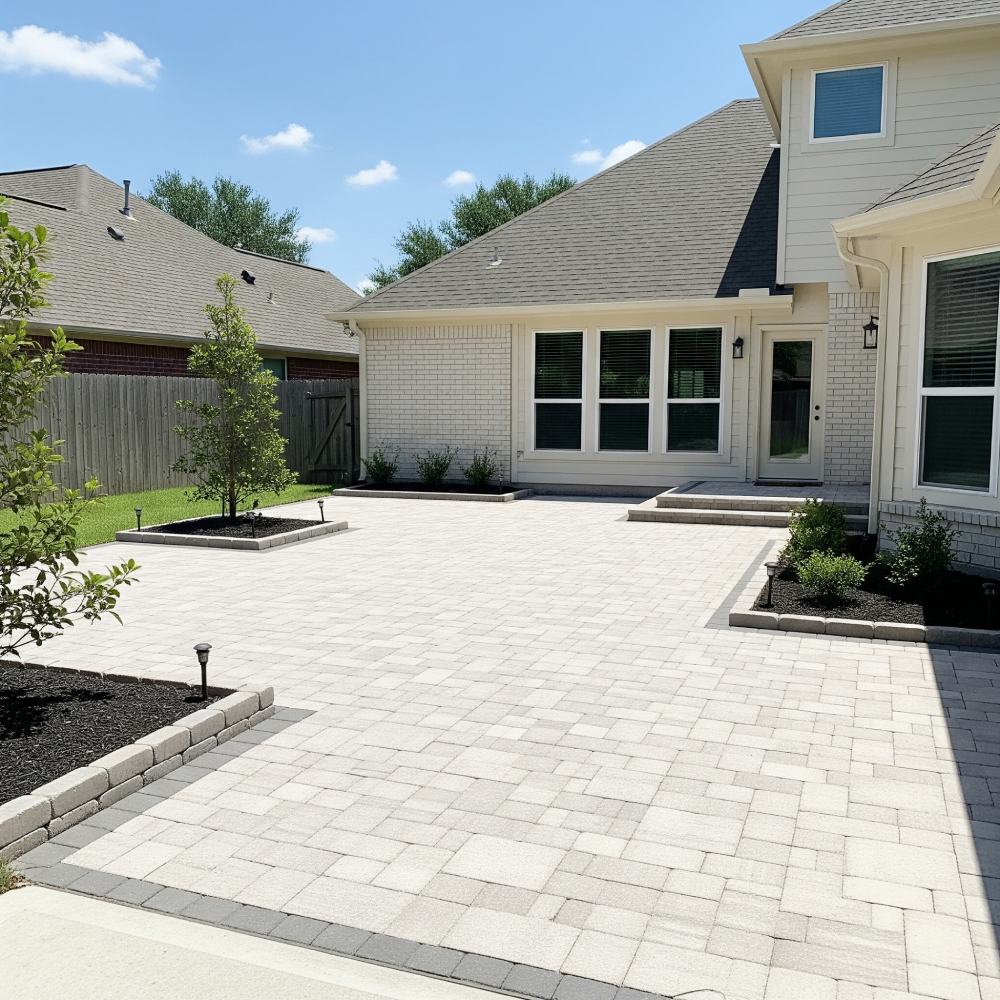
Both concrete and paver patios can be designed to improve your outdoor space — but when it comes to resale value and return on investment (ROI), there are key differences worth considering.
Upfront Costs: Concrete vs. Pavers in Houston
Basic Concrete
Cost: $8–$12 per square foot
Estimated Total (500 sq ft): $4,000–$6,000
Stamped Concrete
Cost: $12–$16 per square foot
Estimated Total (500 sq ft): $6,000–$8,000
Concrete Pavers
Cost: $16–$24 per square foot
Estimated Total (500 sq ft): $8,000–$12,000
Travertine Pavers
Cost: $20–$28 per square foot
Estimated Total (500 sq ft): $10,000–$14,000
Concrete is more affordable upfront — especially for large areas. However, pavers tend to retain value longer and can boost resale more significantly when properly designed and installed.
Resale ROI: What You Can Expect Back
According to remodeling cost vs. value data and Realtor surveys:
Basic concrete patios recoup roughly 30%–50% of their cost at resale.
Stamped concrete offers a slightly higher return, around 50%–60%.
Paver patios, especially those with custom layouts and quality materials, can return 60%–75%, and sometimes more in upscale neighborhoods.
In competitive parts of Houston — such as Bellaire, West University, or Memorial — we’ve seen well-executed paver patios become key selling features, especially when integrated with outdoor kitchens or modern landscaping.
Why Pavers Often Deliver Higher Value
They’re more visually striking and “move-in ready” for buyers.
They photograph beautifully for real estate listings and digital tours.
They signal a higher level of care and quality throughout the property.
Unlike poured concrete, pavers rarely show cracking — even years later.
Bottom Line: If you’re only using the patio for a few years and want to minimize upfront costs, concrete may be the right fit. But if your goal is to increase your home’s resale value, improve curb appeal, and create a backyard that stands out — pavers tend to deliver a much better long-term return, especially in Houston’s climate and real estate market.
Let HLI Help You Choose the Right Patio for Houston’s Climate
At Houston Landscape Images, we’ve been designing and building patios across the Greater Houston area for over three decades. We understand how heat, humidity, and soil movement affect patios in this region — and we use that knowledge to recommend materials and methods that last.
Whether you're leaning toward a stamped concrete surface or want a fully custom paver installation, we’ll walk your property, talk through your goals, and help you build a patio that’s beautiful, functional, and built for the long haul.
You don’t need to have all the answers right now — we’re here when you’re ready.

